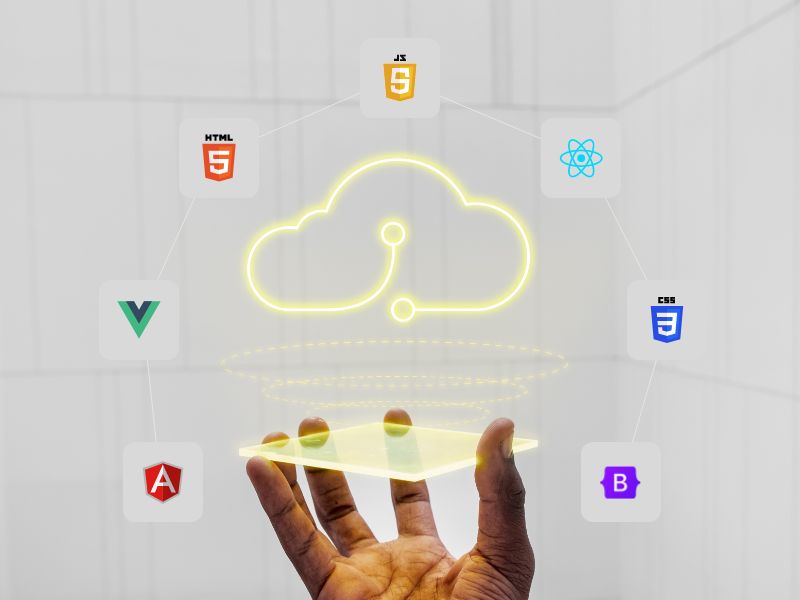Unlocking the Power of SaaS: Picking the Perfect Tech Stack

Are you tired of dealing with inefficient software that doesn’t meet your business needs? Are you struggling to keep up with the demand for seamless integration and scalability? Look no further than a robust SaaS tech stack.
As more and more businesses move to the cloud, having the right tech stack is essential to stay ahead of the competition. But don’t just take our word for it. As Marc Benioff, CEO of Salesforce, said, “Software is eating the world, but it’s the SaaS tech stack that’s doing the cooking.”
By selecting the right combination of databases, application frameworks, UI frameworks, and integration tools, businesses can create powerful and efficient SaaS applications that meet the needs of their customers.
Don’t let outdated software hold you back. Embrace the power of a SaaS tech stack and unlock your business’s full potential.
Build A Successful Business With The Right SaaS Tech Stack
Software as a Service (SaaS) has become an increasingly popular model for software delivery and consumption. SaaS solutions offer several benefits over traditional on-premise software, including reduced IT costs, enhanced scalability, and simplified maintenance. However, choosing the best tech stack for saas can be challenging for businesses, especially those new to the model. Here’s a guide to help you navigate the SaaS tech stack.
Cloud Platform
In the world of SaaS, the cloud platform is the foundation for hosting and delivering applications to end-users. Here are three of the most popular saas technology stack for cloud platforms to consider:
- Amazon Web Services (AWS): AWS is known for its flexibility, scalability, and reliability, offering a wide range of services to cater to your business needs.
- Azure: Azure is popular among businesses already using Microsoft technologies, as it integrates seamlessly with other Microsoft products.
- Google Cloud Platform (GCP): GCP is an excellent choice for businesses heavily relying on data analysis and machine learning, making it a top choice for big data applications.
Choosing a cloud platform for your SaaS tech stack requires careful consideration of factors such as pricing, scalability, security, compliance, and technical expertise. Ultimately, the best cloud platform for your business will depend on several variables, including budget, business requirements, and technical expertise. By leveraging these top cloud platforms, you can host and deliver your SaaS application with ease, agility, and scalability.
Database
The database is a crucial element in any tech stack saas applications, acting as the repository for all application data. When selecting a database, there are several key factors to take into account, including performance, scalability, security, and integration ease.
To ensure that you make the right choice, consider the following top contenders:
- MySQL: A renowned open-source relational database management system that stands out for its flexibility and scalability.
- PostgreSQL: A robust database system that offers advanced capabilities, such as support for complex queries and top-notch security features like SSL encryption.
- MongoDB: A popular NoSQL database that adopts a document-based approach, making it ideal for storing and retrieving unstructured data. It also boasts impressive scalability and robust security features.
By carefully weighing these options, you can develop a SaaS Product and equip your application with a database that best suits your needs.
Application Framework:
When building and deploying cloud-based applications, an application framework is a vital component of the overall tech stack. It provides a comprehensive set of tools, libraries, components and reduces the Cost of SaaS Development that simplify the development process.
Here are three leading cloud application frameworks to consider:
- Ruby on Rails: A framework renowned for its exceptional developer efficiency and emphasis on convention over configuration.
- Django: A high-level Python platform that prioritizes reusability and speedy development.
- Node.js: A popular JavaScript runtime environment that enables fast and scalable server-side development.
By leveraging these powerful frameworks from experienced SaaS application development services, you can streamline your SaaS development process and take your application to new heights.
User Interface (UI) Framework:
The user interface (UI) is a critical aspect of any SaaS application, and the UI framework plays a crucial role in defining its look and feel. There are various UI frameworks available, but here are three top contenders to consider:
- React: A JavaScript library that enables efficient and flexible UI development.
- Angular: A TypeScript-based web application framework that excels in building dynamic single-page applications.
- Vue.js: A progressive JavaScript framework designed for developing impressive user interfaces and single-page applications.
When selecting a UI framework, consider key factors such as ease of use, developer productivity, and performance. By leveraging these top UI frameworks, you can optimize your SaaS application’s user experience and build applications that stand out in the market.
APIs and Integration:
APIs are integral to SaaS applications, enabling seamless communication with other software and systems. As such, integration tools are vital for many businesses. Here are three popular integration tools to consider:
- Zapier: A no-code automation tool that connects web applications, making it easy to automate tasks.
- IFTTT: A free web-based service that allows users to create simple conditional statements, called applets, to automate tasks across web services and apps.
- Dell Boomi: A cloud-based integration platform that enables businesses to connect their applications and data across various cloud and on-premise platforms.
When selecting an integration tool, consider a top-rated custom software development firm who offers such things as ease of use, scalability, and flexibility. These tools offer a reliable way to optimize your SaaS app’s integration capabilities and streamline the workflow, making it easy to get the job done.
Conclusion
At last, the significance of selecting the right SaaS tech stack cannot be overstated when it comes to delivering effective and scalable SaaS solutions. The various components of a SaaS tech stack should be evaluated based on multiple factors such as pricing, scalability, security, and ease of integration, among others. The correct combination of tools and platforms can help businesses achieve greater productivity, efficiency, and customer satisfaction.
At Finoit, we recognize the importance of selecting the best tech stack to deliver the best SaaS product to our clients. We utilize the latest and most suitable technologies to create robust and scalable solutions that cater to the specific needs of our clients. Our expertise in SaaS development and tech stack selection empowers businesses to attain their goals and stay ahead of the competition. Connect with our development expert to avail top-quality SaaS solutions that are built to last.

